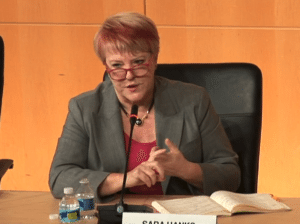
Sara Hanks is well known in the alternative finance/crowdfunding space. Hanks is CEO and founder of CrowdCheck – a due diligence, disclosure and compliance services for online capital formation. She is a Board member of CFIRA and is the current Chair of the SEC’s Advisory Committee on Small and Emerging Companies. But before Hanks did all this, she practiced international securities law and did a tour on Capitol Hill including a stint as Chief of the Office of International Corporate Finance at the SEC. While at the SEC, Hanks led the team that created Reg S – the regulation that provides a safe harbor for offshore sales of equity securities. So Hanks clearly knows international securities law. Therefore it was interesting when Hanks published a post on CrowdCheck about a possible framework for cross-border crowdfunding. And why not?
As Hanks points out, we live in a world without borders (in many respects) and information wants to be free. The internet has become the great equalizer.
The advent of crowdfunded securities has helped to fuel transparency and access in a growing number of countries but, as a US citizen, it can be a challenge to invest in that cool startup listed on a regulated UK platform. The same holds true of investors heading the other way. Why doesn’t the SEC work to make it easier? Good question.

Hanks wants to poke the regulatory Hornet’s nest. And we think it is great.
Looking at our neighbor to the North, Hanks says that Canadian investors have already found online offerings of interest but Canadian regulators are attempting to apply provincial rules to these offers which means dual filings. Instead of having crowdfunding platforms, which are regulated by the appropriate authorities, flee with apprehension when the investors come knocking wouldn’t it be better for the SEC to get in front of this issue?
It’s Complicated …
Hanks, has offered to help out with her own, unsolicited, professional advice. She counsels policymakers to start at Reg S.
Hanks suggests:
- Listing an offering on a platform in a company’s home jurisdiction (Platform Land) and accepting investments from investors in other jurisdictions (Investor Land) is not subject to regulation with respect to registration, qualification, or whatever the local equivalent is in Investor Land provided that:
o No directed selling efforts (emails, advertising, phone calls, etc.) with respect to the offering are made in Investor Land or to persons the issuer or platform know to be located in Investor Land. We may need to set some guidelines as to the extent to which some communications (eg, mass emails) require Investor Land addresses to be filtered out.
o The offering is made on a platform operating in compliance with Platform Land’s rules for platforms and rules or custom with respect to documentation and procedures.
o Every investor in Investor Land is required to affirmatively agree, as part of the investment process for each investment, that they understand that the registration and disclosure provisions of Platform Land apply, and that the protections provided to investors in Investor Land will not apply.
- The jurisdictional reach of the laws and rules that apply to fraud are not affected by these principles.
 Hanks explains;
Hanks explains;
“I get that we are dealing here with a combination of less-experienced investors and more-risky companies, a combo guaranteed to cause heartburn to regulators. But without some consistent cross-border regime we are going to be stuck with the current situation where many platforms refuse to take foreign investors while others accept them, and the heightened risk.”
You may read Hanks entire missive on the subject here.
Intrigued by her forward thinking, Crowdfund Insider reached out with several questions.
Crowdfund Insider: Isn’t part of the issue the definition of an accredited investor? Some platforms accept US investors but they must be accredited.
Sara Hanks: Whatever the definition of accredited investor, overseas platforms are going to be leery. First point is, however, accredited investor is defined, you’re going to have to either take steps to make sure they are accredited in order to rely on 506(c), or rely on non-advertised 506(b) (in which case how have you managed to attract US persons to your site in the first place?). The second point is, even if you only accept accredited investors, you are selling securities in the US and subject to both federal and state antifraud law, and open to lawsuits from both regulators and investors. State antifraud law is the more scary in some states, because some states impose “aiding and abetting” liability and also impose liability for unintentional actions.
Crowdfund Insider: Keith Higgins, former SEC head of CorpFin, appeared to address this issue in a speech last year. Is the SEC inclined to address this issue or is it a “hornet’s nest” at the Commission?
Sara Hanks: In context, Keith was talking specifically about registered public offerings being made in several jurisdictions. Crowdfunding offerings are of course exempt from registration. The issue of how to coordinate the review and registration process of an offering being made simultaneously in several jurisdictions has been a challenge since the days of the first privatizations of government enterprises in the UK in the mid-1980s. These offerings were typically made in several jurisdictions at once because local markets couldn’t absorb multi-billion dollar offerings. However, selling in several countries at once posed a challenge where, for example, the regulator in Country A required the issuer to provide projections and Country B prohibited them. There have been some attempts to coordinate regulations internationally over the years, but as Keith notes, the long-term trend is away from multi-country public offerings for several reasons. One of the biggest reason in the US is that offerings to institutional investors in these circumstances are generally made in Rule 144A exempt offerings.
 Even though Keith wasn’t talking about multijurisdictional offerings, would there be any interest in taking up the topic? Not really at this point. There are not so much nests of hornets at the Commission as . . . crickets. I have never seen so many senior people leave upon a change of Administration. I think there’s only one Division Director in place; the rest are Acting. There is no Chair and only two Commissioners. Any initiative to address cross-border crowdfunding would generally start at the level of the Division of Corporation Finance. With no Chief of the International Office in place, and no Division Director, there’s really no place to start. You’d need someone in the Division recognizing this as an issue before there could be a start to the conversation.
Even though Keith wasn’t talking about multijurisdictional offerings, would there be any interest in taking up the topic? Not really at this point. There are not so much nests of hornets at the Commission as . . . crickets. I have never seen so many senior people leave upon a change of Administration. I think there’s only one Division Director in place; the rest are Acting. There is no Chair and only two Commissioners. Any initiative to address cross-border crowdfunding would generally start at the level of the Division of Corporation Finance. With no Chief of the International Office in place, and no Division Director, there’s really no place to start. You’d need someone in the Division recognizing this as an issue before there could be a start to the conversation.
Another unknown is the overall regulatory environment. The President’s kill-two-rules-for-every-one-you-create [Executive Order] does not currently apply to the independent agencies, as I understand it, but who knows if that was intentional and how it might change.
In any case, it’s not the US that is the biggest obstacle here. We have crowdfunding rules. Canada is posing some of the biggest challenges. It’s Canadians wanting to invest in US crowdfunding offers that prompted my original blog post.
Crowdfund Insider: In your opinion, is it better to have a bilateral approval process? Or does the SEC establish a set of criteria for a platform to gain access? Is this an area where Congress should act?
Sara Hanks: Not sure what you mean by approval process. You mean as in Country A not treating an internet posting in Country B as being anything that needs to be regulated in Country A, even if Country A’s residents invest in that offering? The SEC could, if it wanted, adopt rules that say, in effect, “we won’t view crowdfunding offers made from Country B as being subject to our rules because we are good with Country B’s rules and they are good with ours.” But most bilateral MOUs with other countries take years to negotiate and deal with bigger-picture issues than specific exemptions from registration, etc. Congress couldn’t help because they wouldn’t have any power over Country B. The best way this would happen would be some multinational arrangement.
And on that topic, the movement of capital across national borders is, to a certain extent, a trade issue. No idea if other trade issues currently being discussed would make this impossible.
 Crowdfund Insider: Isn’t this a situation where it is better to be proactive and create a path to accepting US investors as opposed to enduring an ongoing enforcement challenge?
Crowdfund Insider: Isn’t this a situation where it is better to be proactive and create a path to accepting US investors as opposed to enduring an ongoing enforcement challenge?
Sara Hanks: Again, from the point of view of most of the issuers I work with, this is an “outgoing” problem more than an “incoming” one. My clients want to accept funds from foreigners without having the regulatory authorities in the investors’ countries saying “you sold into our country and so you need to register the offering and also comply with our broker-dealer rules.” Because non-US platforms and companies routinely exclude US investors (both in the crowdfunding context and in other offerings) due to our complex rules and litigious environment, I don’t come across a lot of folks saying, “we want to accept investments from US persons.”

